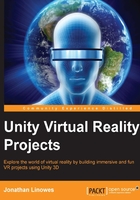
Summary
In this chapter, we looked at virtual reality and realized that it can mean a lot of things to different people and can have different applications. There's no single definition, and it's a moving target. We are not alone, as everyone's still trying to figure it out. The fact is that virtual reality is a new medium that will take years, if not decades, to reach its potential.
VR is not just for games; it can be a game changer for many different applications. We identified over a dozen. There are different kinds of VR experiences, which we'll explore in the projects in this book.
VR headsets can be divided into those that require a separate processing unit (such as a desktop PC or a console) that runs with a powerful GPU and the ones that use your mobile phone for processing. In this book, we will use an Oculus Rift as an example of desktop VR and Google Cardboard as the example of mobile VR, although there are many alternative and new devices available.
We're all pioneers living at an exciting time. Because you're reading this book, you're one, too. Whatever happens next is literally up to you. As the personal computing pioneer Alan Kay said, "The best way to predict the future is to invent it."
So, let's get to it!
In the next chapter, we'll jump right into Unity and create our first 3D scene and learn about world coordinates and scaling. Then in Chapter 3, VR Build and Run, we'll build and run it on a VR headset, and we'll discuss how virtual reality really works.